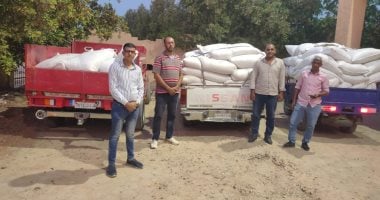Fayoum Governorate witnessed intensive efforts to tighten control over markets, prevent exploitation, and monitor prices. The Supply Directorate launched major campaigns issuing 1366 diverse supply reports across various centers and villages in the governorate. Additionally, inspection tours were conducted at fuel stations to catch violators.
Dr. Ahmed Al-Ansari, Governor of Fayoum, stated in exclusive remarks to Youm7 that market monitoring and price control are top priorities for the governorate. He continuously follows the efforts of the Supply and Internal Trade Directorate to regulate markets and monitor prices.
The governor emphasized the importance of continuing market and sales outlet inspections to ensure the availability of high-quality food commodities at reasonable prices, with strict measures against goods hoarders and commercial fraud. These efforts align with political leadership directives to regulate markets, protect consumers, and ensure compliance with health standards and food safety.
Samah Shabl, Director of the Supply and Internal Trade Directorate in Fayoum, reported that July’s campaigns resulted in 1366 varied supply reports, including violations in bakeries, mills, markets, and petroleum sectors. Specifically, 791 violations were in bakeries, including 174 reports for bread weight shortages, 71 for producing bread not meeting specifications, 20 for collecting subsidized local flour, and 502 related to bakeries.
Regarding markets and petroleum products, 575 reports were issued, including 296 for failure to display prices, 63 for selling above price, 18 for expired products, 52 for meat violations, 50 for lack of health certificates for workers, plus other violations related to commercial fraud and unauthorized trading of subsidized goods.
The campaigns seized large quantities of violating goods, including 13,314 kg of subsidized local flour collected for profiteering, 3,500 grams of unknown industrial coloring, 2,400 kg of banned bran, 5,788 expired grocery items, 170 kg of poultry and fish slaughtered outside government slaughterhouses, 121 bags of agricultural fertilizers prohibited for sale or use, 163 kg of expired meat and meat products, 78 expired cosmetic products, 8 cartons of expired soap, 3,300 kg of used cooking oil unfit for human consumption, 239 cartons of expired butter, 79 kg of expired cheese unfit for consumption, 47 packages of veterinary medicines of unknown origin, 120 packages of expired agricultural pesticides, 4,206 packs of cigarettes of unknown origin, 700 kg of sugar, 94 bottles of subsidized oil, and 19 gas cylinders sold on the black market for profiteering.













Recommended for you
Talib Al-Rifai Chronicles Kuwaiti Art Heritage in "Doukhi.. Tasaseem Al-Saba"
Exhibition City Completes About 80% of Preparations for the Damascus International Fair Launch
Unified Admission Applications Start Tuesday with 640 Students to be Accepted in Medicine
Egypt Post: We Have Over 10 Million Customers in Savings Accounts and Offer Daily, Monthly, and Annual Returns
His Highness Sheikh Isa bin Salman bin Hamad Al Khalifa Receives the United States Ambassador to the Kingdom of Bahrain
Al-Jaghbeer: The Industrial Sector Leads Economic Growth